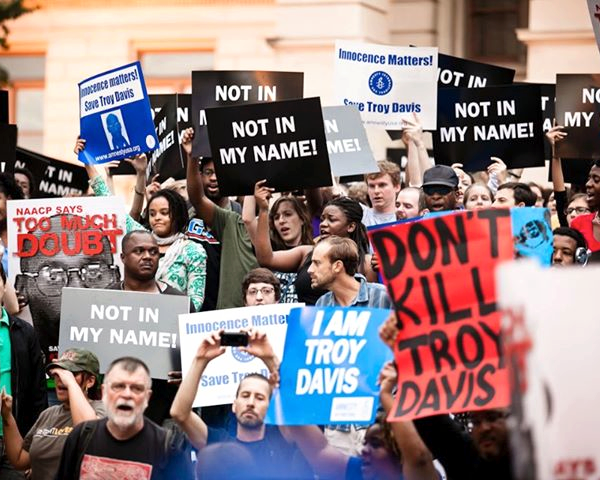On Life & Death By Committee
TV Review
“I think if your clients want to sit on my shoulders and call themselves tall, they have a right to give it a try, but there’s no requirement that I enjoy sitting here listening to people lie.”
–The Social Network
“I have a little brother named Sam, … and there’s no doubt that he’d be living a great life right now, except for that he’s dead. …. I’m sorry, Sam. You deserved better in my hands. And I apologize. That’s all.”
–Sports Night
“Well, first of all I’d like to address the MacPhail family. I’d like to let you all know, despite the situation—I know all of you are still convinced that I’m the person that killed your father, your son and your brother, but I am innocent. … I did not have a gun that night. I did not shoot your family member. But I am so sorry for your loss. … I ask my friends and family that you all continue to pray, that you all continue to forgive. Continue to fight this fight. For those about to take my life, may God have mercy on all of your souls. God bless you all.”
– Troy Davis, last words.
“So your staff spent the weekend looking for a way out.”
“Yeah.”
“Like the kid in right field who doesn’t want the ball to get hit to him.”
–The West Wing
Human beings are inherently bad at deciding when to begin or end another human life—especially in groups, including pairs. It’s never you; it’s always me or us. It’s a language we have been able to speak inaccurately at great cost every day—and usually by accident.
This past Sunday, The Newsroom put on an inspiring show that centered, sort of, around the execution of Troy Davis. The show was uplifting and sad, concise and brilliant, and one of the best things I’ve watched on television since Aaron Sorkin left The West Wing. And I should be writing about it, but the subject matter touched on my life outside of a love for seeing my own name attached to a headline, and I can’t not talk about it, so bear with me.
When I’m not writing for Digital Americana about dialogue I geek out on, I work as an intern in the death penalty unit of a public defenders’ office (for the next two weeks, anyway). I didn’t come to the job to exercise an anti-death penalty chip on my shoulder or a passion for defendants’ rights, although I have both—I got here largely by laziness. I applied to two summer jobs well in advance of summer and was lucky enough to be offered one of them. I took it.
Over the course of my time here, I’ve realized something that should have been easier to grasp at a younger age: societies aren’t able to do this in any way you might deem “proper.” Aside from any talk about wrongful convictions, DNA exonerations, or due process, one of the biggest takeaways from the last year or so working in public defense is that the other actors in the judicial tripod—the prosecutors, police officers, judges, and juries—got to their immeasurably powerful decision-making roles through much the same route I got to mine: chance. Most if not all who decide whether the state can or should end a life get there without passing the kind of skills-test you’d want for someone with that responsibility. They get there because the DA’s office is a good gig, or they’ve wanted to be a cop since they were six and the cops are the only ones hiring, or because they love the law and want to help make it—or because jury duty is mandatory and as random as a crowded city street corner. Certainly not because they are qualified or trained to decide who lives or dies. I can only speak from my own, definitely-biased experience, but that isn’t true of those on the other side—at least, those that do it well. The people that gave up partnerships and boats to try to keep (alleged) rapists, murderers, druglords, thieves, pedophiles, retards, psychopaths, drug addicts, fuck-ups—criminals, the occasional innocent, and increasingly, the criminally poor—alive. You don’t read 450 pages of memos about the horrific child abuse your client suffered because you think it will help your win-loss record.
The Newsroom’s second episode of season two, “The Genoa Tip,” put some of the weight of that enormous paragraph on the shoulders of producer Don Keefer (Thomas Sadoski). Don’s recently been through a complicated break-up (see: every episode up to now), but now he’s back to focusing on the news, specifically the last days of Troy Davis (see: Wikipedia). One might think there is some displaced energy driving his incessant appeals for News Night anchor Will McAvoy (Jeff Daniels) to cover the Davis case more closely, but we hear early on that Don has been following this case for years, to the extent that he writes letters to the family and possibly Davis himself.
Then we have one of the many high points of this episode: the exposure of years of dedication and experience on the part of what had previously been The Newsroom’s supporting characters. And it’s not just Don; another example comes later in the show, as Sloan Sabbith (Olivia Munn) and Elliot Hirsch (David Harbour) fight tooth-and-nail in to lose their chance at the spotlight: the 9/11 anniversary coverage. Will has been taken off the job due to concerns from the corporate office over comments he made about the Tea Party—despite the fact that he anchored the initial broadcast—by chance—while still working as a legal correspondent. The two junior anchors push Will to fight back against the decision (because he hasn’t yet told them it wasn’t his to make), and their passion for the leader of their team, regardless of his somewhat exalted status and his season-one narrative as a thorny narcissist, becomes clear.
What I love about this episode (and especially this moment) is the shifting character development. Will becomes more of a prosecutor than we’ve ever seen him as before; Don becomes the passionately hopeless defense attorney; executive producer Mackenzie McHale (Emily Mortimer) gets to display her pre-season-one knowledge and experience of wartime/military journalism. In Sloan and Elliot’s defense of Will taking the anchor desk for the 9/11 anniversary, we see their bona fides as his team members, we see that they remember his coverage from that awful, pretty day, and that they aren’t, in fact, supporting or opposing characters but are actually old guard—the rear guard. If season one taught us to trust Jim’s new blood and Maggie’s insight, this exchange seems to teach us that there is something apart from acumen that makes people good at their jobs: not experience, but shared experience.
There are many other great moments from this episode for old-time fans and newbies alike. For fans of the show’s love letters to journalism, there are interesting exchanges about the idea of journalism vs. advocacy. For fans and/or haters of the show’s oft-mentioned love triangle (especially those who wanted to see some comeuppance in there for you-know-who), there is an unraveling of thread spooled with the best intentions that you will find sad or cathartic or both. For those of you looking for straight smart-Sorkin dialogue-dope, there is plenty; a tiny taste:
“How long do you guys give people shit in New York?”
“Ask A-Rod.”
There is a new force behind a new character, Jerry Dantana (Hamish Linklater), and his exchange with Mackenzie over the story that the premiere told us would bring the house of cards to the ground has me excited to see how much of season two plumbs Sorkin’s seemingly endless depths of knowledge of how committees of the well-meaning can fail at imposing life as well as death. I started this review somberly (just got home from work), but I am genuinely excited about this series in ways that go beyond my simply missing the sound of Sorkin’s dialogue. Linklater’s performance so far has been wonderful and I find myself rooting for the (apparent) hubris that leads him and his adoptive news team to the deposition table.
The one speed-bump in this entire episode, a gender-based discussion of closets and showers, isn’t even that bad and probably stumped me the most because I have neither a closet, nor a shower, nor a gender that I am loyal to or proud of. Watch this episode however you can, whenever you can, and pay attention to The Newsroom’s season two; so far it looks like Sorkin is out for blood.
Close

